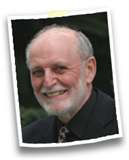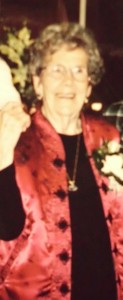I’ve always admired people who are future-focused, particularly older people. I remember Stuart Briscoe saying, “I’m in my 70’s now, and most of life is behind me. My continual temptation is to think backwards, but I’m fighting that. God still wants me to look to the future.”
My Aunt Joyce was another example of being future-focused. She called from California one day when she was 91, concerned about my mom’s health. Half way through the conversation she said, “I apologize for talking a little funny. I’m bleaching my teeth.” I loved that she was still looking toward the future.
Grieving the death of a spouse virtually always includes a long period of looking back, because in our sorrowful state, going back to those last weeks and days somehow keeps us emotionally linked with those we so recently lost. Besides, looking forward is scary, while looking back is familiar.
Although I’m not focusing backwards with the same frequency or fervency I once did, from this vantage point I see it was healthy and healing to do that. It was part of what helped me accept the sad truth. When my mind said, “I just can’t believe he’s gone!”, looking back told me, “It’s true. He’s gone.”
It’s been 17 months since Nate died, but I had to stop to count them up, unlike earlier days when I always knew. Now, when I mentally revisit Nate’s 42 days of cancer, his death scene, the wake and funeral, it’s not as difficult, not as sad. As a matter of fact, when I look back now, one of the things I do is analyze how we did and didn’t handle things well.
So, for families currently living through the heartbreaking days of terminal disease, I share below what I’ve learned (three things today, the rest tomorrow):
1. We knew of Nate’s impending death for 42 days, and we got to day #27 before we first talked about heaven. It was day #30 before Nate mentioned his fear of the pain that might come just before the end. I wish I would have broached these subjects earlier, especially the topic of heaven. Talking over the delights of what awaited him, as well as leaving earthly suffering behind, would have lifted his spirits.
2. I didn’t realize how quickly mental exhaustion would overwhelm Nate’s ability to converse and think, or to want to be part of his bustling, noisy family. He sequestered himself far more rapidly than I thought he would, at a faster pace. Even while sitting in the midst of us, he wasn’t always “there”.
3. I wish I’d known how quickly physical fatigue would overtake him. The day we scheduled his last visit with our pastor, he was too tired to participate in the conversation. Nate’s last visit to his law office came within a hair of being cancelled. He wasn’t sure he could stand long enough to ride the elevator to the 13th floor and didn’t want to use the wheelchair. He made it, but it took every ounce of stamina he had left. Had I known, we would have gone earlier.
Tomorrow I’ll share six more suggestions for those of you who are walking the difficult path of terminal illness.
“No one knows when their hour will come.” (Ecclesiastes 9:12)



Ah, dear Mom! Each day she was excited about ways the Lord could use her, even after Dad died. I did love it that she happily gave up her treasures from 653, saying that she had enjoyed them and now it was time to pass them on to others. She celebrated her new, down-sized living by purchasing beautiful new furniture, and never looked back!
Four years ago I had two major surgeries in 7 months and it has taken a long time to get most of my energy back. Harv and I attended a leadership summit at Willowcreek two years ago and while singing a song the tears began to flow – in thanksgiving and praise for my life. I knew God still had something for me to do and now at 81 I’m still “doing”. I am so grateful for the ability physically and mentally to be active for the Lord. Praise God!
You hit the nail on the head again, today! You’re on a roll, girl!
I am blessed everyday by some of those treasures Aunt Joyce gave up. Margret your blog is such a daily encouragement to me. Thank you for faithfully using your gift.